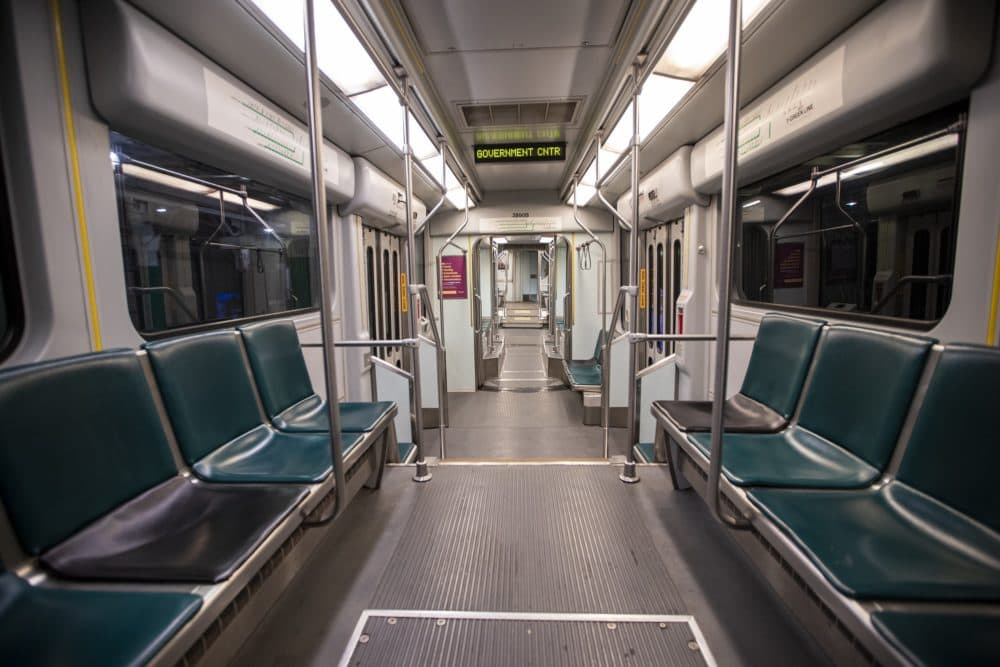Advertisement
Commentary
The MBTA Is On Life Support. Only The Feds Can Save It Now

To paraphrase those great transit analysts, the Kingston Trio, Charlie may never return if the Massachusetts Bay Transportation Authority (the “T”) enacts contemplated service cuts. And straphangers in other cities will find themselves stranded without a ride, too, as congressional Neros fiddle while transportation budgets burn.
The T’s ridership and revenues cratered as the pandemic forced many patrons into remote work or the unemployment line. That fact, and Congress snagging itself on partisan bickering over COVID-19 aid, has transit officials talking cuts of more than $100 million to bus, rail and ferry service, most beginning in spring.
That may sound like a nick in an overall budget north of $2 billion. But it would require eliminating 25 of 169 bus routes, consolidating another 14, and shortening five; eliminating bus and train service after midnight; running 60 non-essential bus routes less often, and all trains 20 percent less frequently; and ending weekend service for the commuter rail.
And if you want a straight shot from downtown Boston to Hingham or Hull or Charlestown, swim. Ferry service would be torpedoed.
At its Monday meeting, the T’s management board heard public pleas to preserve service when it votes as early as next week. People made reasonable points, but I wonder how many here and in other states have called their congressional representatives? Cities and states don’t have the money by themselves to keep the buses and trains rolling. Uncle Sam needs to pony up — quickly.
Cities and states don’t have the money by themselves to keep the buses and trains rolling. Uncle Sam needs to pony up -- quickly.
A veteran T commuter, I’m fortunate that I can work from home. That luxury is unattainable for those who must work on-site, or who’ve lost work. Transit officials commendably say they’d shield poor neighborhoods from their cuts. But those disruptions would still spill better-heeled riders into their cars and onto roads, feeding pollution and congestion.
The T isn’t relying on machetes alone to hack out of the financial thicket; it hopes to log savings elsewhere, by refinancing debt and tapping funds that had been earmarked for long-term projects, for example. (Fare increases aren’t on the table for now.) Meanwhile, advocates urge “new sources of progressive revenue” to avert the cuts. But those sources haven’t plugged the deficit of political support on Beacon Hill.
Even if Massachusetts hiked taxes for transit, that wouldn’t help Washington, D.C., which is staring “the death of transit as we know it” in the face absent a federal rescue, the Washington Post says. D.C.’s despair comes despite the fact that voters in the Virginia burbs approved borrowing millions to contribute to the system, demonstrating that such commendable measures, which passed in many jurisdictions last month, can’t by themselves fix the problem.
It’s equally dire in the Big Apple. “The parking lots at Port Washington are plains of empty asphalt,” the Financial Times lyricizes about suburban day spaces for Long Island Rail Road commuters’ cars. The lots aren’t the only thing that’s empty. Coffers of the New York Metropolitan Transportation Authority are saddled with a $12 billion deficit. Without federal aid, the paper reports, the system may furlough 8,000 employees and slash subways, bus and rail service.
Transit in metropolises across the country is on similar life support.
Boston officials vow to restore services once the economy recovers. But there is reason to be skeptical that ridership would rebound. Employers who can keep workers remote to save office rentals have said they’ll continue doing so — and many workers express a preference for more work-from-home days.
Meanwhile, transportation activists worry that once T-alienated riders settle into their cars, they’ll stick with those options post-pandemic. While private transportation imposes public costs in congestion and climate change, it’s often quicker than a T ride. And there are no waits for the bus or train in the frigid New England winter.
Joe Biden pledged to provide “every American city with 100,000 or more residents with high-quality, zero-emissions public transportation options ..."
It’s even chillier for transit supporters in the halls of Congress. The $15 billion for transit in the ballyhooed, bipartisan COVID package is half of what officials say they need — and $15 billion more than Senate Majority Leader Mitch McConnell has agreed to so far. Perhaps McConnell — for months a roadblock impeding any deal — cut his high school class that discussed how, since the republic’s early days, public works have been understood to require federal participation.
It needn’t be said that those posing as guardians of fiscal responsibility are liars; they weren’t anguished by inflated deficits from Donald Trump’s tax-cut-for-those-who-didn’t-need-it. Or that, with borrowing costs low and returns on public investment high, cries of we’re burdening future generations with unaffordable debt! are voodoo economics.
Joe Biden pledged to provide “every American city with 100,000 or more residents with high-quality, zero-emissions public transportation options through flexible federal investments.” His ambition must hurdle GOP obstructionism and some transit officials’ argument that service cuts should stick, even if Uncle Sam comes to the rescue, until ridership returns to service-sustaining levels. (While understandable, their stuffing federal aid under the mattress would blunt the economy-stimulating effects of the money.)
We owe our rebounding employment to March’s CARES rescue package. Continued recovery hinges on more aid. Conservative columnist David Brooks captures the moment: “If we can’t get a COVID-19 relief package through Congress in the next week or two, we’re sunk.”
